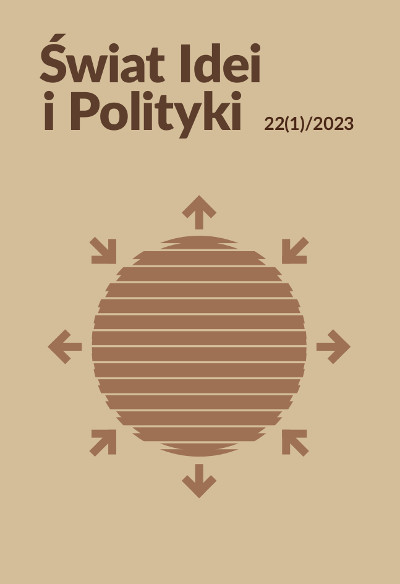At the roots of the post-communist division. The programmatic discourse of the Centre Agreement in the 1991 parliamentary elections
DOI:
https://doi.org/10.34767/SIIP.2023.01.01Keywords:
anticommunism, right wing, political division, political manifesto, elections, political parties, PolandAbstract
The negotiated rejection of the authoritarian system and the transition to democracy involves not only a change in the institutional structure of the former regime, or its personnel composition, but entails taking a stand on its legitimizing formula, traditions and symbols. Disputes over the nature, scope and pace of transformation during the transition period become an important stake in political divisions, reinforcing the persistence of political identities formed on the basis of attitudes toward the ancien regime. The case of the Polish party system provides an excellent exemplification of the importance of political divisions over the past regime and how to settle accounts with it. They influenced the semantic scope of the left-right division, as well as the structure of inter-party competition. The task of this text is to reconstruct the discursive mechanisms of division-building by means of references to communism, as well as the way of defining the situation and related proposed tools for repairing the status quo. The sample contains programmatic documents adopted by Centre Agreement during the party’s First Congress in March 1991, as well as the programmatic documents of the coalition actor, the Centre Civic Agreement, distributed during the 1991 parliamentary election campaign.
References
Antoszewski, A. (1994). Retrospektywna legitymizacja zmiany politycznej w Polsce. W: R. Gelles (red.), Acta Universitatis Wratislaviensis. Studia i szkice z dziejów najnowszych, politologii i socjologii (ss. 285–296). Wrocław: Wydawnictwo Uniwersytetu Wrocławskiego.
Bélanger, É. & Meguid, B.M. (2008). Issue salience issue ownership and issue-based vote choice. Electoral Studies, 27(3), 477–491. DOI: 10.1016/j.electstud.2008.01.001.
Bukowska, X. (2002). Język polskiej polityki u progu XXI wieku. Analiza programów wyborczych ugrupowań politycznych. W: M. Warchala (red.), Przyszłość polskiej sceny politycznej po wyborach 2001. Warszawa: Wydawnictwo Instytutu Spraw Publicznych.
Charkiewicz, E. (2007). Od komunizmu do neoliberalizmu. Technologie transformacji. W: E. Majewska & J. Sowa (red.), Zniewolony umysł 2 (ss. 23–84). Kraków: Korporacja Ha!Art.
Chmielecki, A. (2023). Porozumienie Centrum: studium działalności partii i środowiska politycznego. Warszawa: Instytut Dziedzictwa Myśli Narodowej im. Romana Dmowskiego i Ignacego Jana Paderewskiego / Wydawnictwo Neriton.
Dean, J. (2019). Antykomunizm jest wszędzie wokół nas. Praktyka Teoretyczna, 31(1), 15–24. DOI: 10.14746/prt.2019.1.1.
Eder, N., Jenny, M. & Müller, W.C. (2017). Manifesto Functions: How Party Candidates View and Use Their Party’s Central Policy Document. Electoral Studies, 45, 75–87. DOI: 10.1016/j.electstud.2016.11.011.
Gibson, W.J. & Brown, A. (2009). Working with qualitative data. London: SAGE.
Grabowska, M. (2004). Podział postkomunistyczny. Społeczne podstawy polityki w Polsce po 1989 roku. Warszawa: Wydawnictwo Naukowe Scholar.
Herbut, R. & Jednaka, W. (1994). Partie i system partyjny w Polsce na tle tendencji rozwojowych w wybranych państwach Europy Środkowej i Wschodniej. W: A. Antoszewski (red.), Ewolucja polskiego systemu politycznego po 1989 roku w świetle komparatystycznej teorii polityki. Wrocław: Wydawnictwo Uniwersytetu Wrocławskiego.
Kleinnijenhuis, J. & van Atteveldt, W. (2014). Positions of parties and political cleavages between parties in texts. W: B. Kaal, I. Maks & A. van Elfrinkhof (red.), From Text to Political Positions : Text analysis across disciplines (ss. 1–20). Amsterdam/Philadelphia: John Benjamins Publishing Company.
Korycki, K. (2023). Weaponizing the past: collective memory and Jews, Poles, and communists in twenty-first-century Poland. [b.m.]: Berghahn Books.
Kubik, J. (2019). Cultural approaches. W: W. Merkel, R. Kollmorgen & H.-J. Wagener (red.), The Handbook Of Political, Social, And Economic Transformation (ss. 84–94). Oxford: Oxford University Press.
Laver, M. (2001). Position and salience in the policies of political actors. W: tegoż (red.), Estimating the Policy Positions of Political Actors (ss. 66–75). London – New York: Routledge.
Lipiński, A. (2016). Prawica na polskiej scenie politycznej w latach 1989–2011: historia, organizacja, tożsamość. Warszawa: Dom Wydawniczy ELIPSA.
Mark, J. (2010). The unfinished revolution: making sense of communist past in Central-Eastern Europe. New Haven – London: Yale University Press.
Młyniec, E. (2002). Program polityczny. W: A. Antoszewski & R. Herbut (red.), Leksykon politologii. Wrocław: Atla 2.
Moll, Ł. (2019). Wymazywanie tego, co wspólne: od polskiego antykomunizmu do uniwersalnego antykapitalizmu. Praktyka Teoretyczna, 31(1), 118–145. DOI: 10.14746/prt.2019.1.6
Ost, D. (2007). Klęska „Solidarności”: gniew i polityka w postkomunistycznej Europie. Warszawa: Muza.
Pańków, I. (1998). Podziały w obozie solidarnościowym. Pluralizm polityczny a scena polityczna. Warszawa: Instytut Studiów Politycznych PAN.
Słodkowska, I. (1997). Partie i ugrupowania polityczne polskiej transformacji. W: J. Wasilewski (red.), Zbiorowi aktorzy polskiej polityki. Warszawa: Wydawnictwo ISP PAN.
Walicki, A. (2013). Od projektu komunistycznego do neoliberalnej utopii. Kraków: Universitas.
Wiatr, J.J. (2003). Narodziny i przemiany systemu wielopartyjnego. W: J.J. Wiatr, J. Raciborski, J. Bartkowski, B. Frątczak-Rudnicka & J. Kilias (red.), Demokracja polska 1989–2003. Warszawa: Wydawnictwo Naukowe Scholar.
Zawadzka, A. (2016). Recepcja piętna „żydokomuny” w ujęciu międzypokoleniowym: Szkic do badań. Teksty Drugie, 1, 88–107. DOI: 10.18318/td.2016.1.6.
Żukowski, T. (2011). Lewica i PRL w dyskursie głównego nurtu. W: K. Chmielewska & G. Wołowiec (red.), Opowiedzieć PRL (ss. 196–211). Warszawa: Wydawnictwo IBL.


